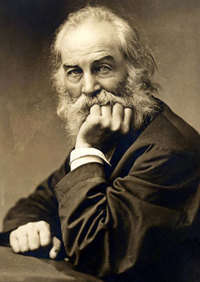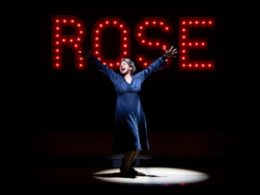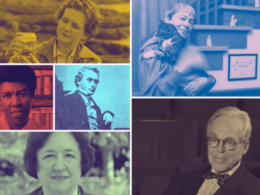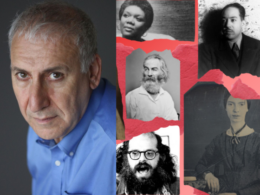Watch: “Song of Myself” Verse 4 read by Caden Grider (2:49)
“Of every hue and caste am I, of every rank and religion,” Walt Whitman announces in “Song of Myself,” his best-known poem. In a new documentary video project, that assertion comes to vivid and continually surprising life.
Whitman, Alabama is a series of videos in which filmmaker Jennifer Crandall enlists ordinary citizens from all over Alabama to recite excerpts from “Song of Myself” while also sharing something of their own lives with the camera. In each segment, a different reader—who might be a circuit judge, a teenage immigrant from Guinea, a radio host, or a young baseball player—is matched with a verse; as the poem consists of fifty-two verses, the videos are being released at the rate of one per week over the course of a year.
The juxtaposition of Whitman’s exuberant free verse with everyday, down-home contexts can yield results that are both poignant and thought-provoking—see, for instance, Donnie Goodin rendering “I am large, I contain multitudes,” from Verse 51. The project starts to achieve a cumulative power, and its overall arc becomes clearer, as more videos are released; the collaborators Crandall has selected are themselves the “nation of many nations” the poem exalts, and her choices also honor Whitman’s claim to embody “them the others are down upon.”
Library of America was immediately intrigued by Crandall’s project after reading about it in a (highly recommended) New Yorker web article last month. Via email, we reached out to her to learn more about the inspiration and intent behind Whitman, Alabama.
LOA: We’re curious to hear how you pair your readers with Whitman’s verses. Do you begin with a particular verse in mind and find a reader to suit it, or do you encounter the readers first and then decide what verse might be a match for them?
Crandall: We come at it both ways. Usually we meet the person first, then decide on a verse, but sometimes a verse will spark an idea and we’ll go from there. It’s a pretty loose process that nevertheless has some form to it. The aim is to create layers of meaning while leaving room for new meaning to emerge. I usually consider three different things: contrasts, similarities, and serendipity.
Contrasts (or perceived contrasts) between things are really fun to work with—they can highlight moments, themes, or visuals better than perceived similarities. I’ll think about what I know of the reader before filming (usually very little). Then, whether it might be interesting to juxtapose them with a verse that seems to contrast with who they are. Virginia Mae Schmitt, who read the first verse of the poem, was 96, maybe 97 years old at the time we filmed. Among the lines she read was: “I, now thirty-seven years old in perfect health begin.”
Viewers may or may not pick up on these contrasts, but they’re there, and allow us to expand on notions of identity. It’s no accident that we’ve chosen a poem written by a white man from New York to showcase a multitude of voices in the Deep South.
Watch: “Song of Myself” Verse 32 read by Laura and Brandon Reeder (3:04)
On the other hand, similarities can make things pop. In Verse 32 [embedded above] Whitman writes about animals and what they can teach us. For this project we met Brandon, a farrier—someone who trims and shoes horses’ hooves. We wanted to film Brandon working and thought it would brighten everything to pair him and his work with a verse that felt somewhat akin. “A gigantic beauty of a stallion,” Whitman writes. “Head high in the forehead, wide between the ears,” Brandon reads as he lifts the hind leg of the horse.
The third thing I think about is how to allow for serendipity. Verse 43 is a good example of this. One day we hit the road to film with no person or destination in mind; the only thinking that went into choosing that verse was that we happened to be on Route 43 at the start of the day. So much of the good stuff that followed was due to chance and luck. One particular moment sticks out—when we meet Anthony sitting in a chair under a tree. Anthony has difficulty reading, but the surprise he gave us at the end of his recitation was a real gift to this project.
Allowing for serendipity means we actively try not to fixate on expectations we have for a reader or what we want out of the day, rather, we open ourselves up to things we may not even know are there until we encounter them.
If we’re really lucky, each of the videos will result from some mixture of all the above.
LOA: How familiar is Whitman among the Alabamians you’ve collaborated with so far? Is he a poet they might have read in high school?
Crandall: When I ask someone if they might read for us I always ask, “How familiar are you with ‘Song of Myself’ or Walt Whitman?” Without a doubt the most common response is a pause followed by, “I know we had to read him in high school, but that’s about it.” Anecdotally, I’d say the response we’ve had from Alabamians is the same as those I’ve had when talking about this project with people from California, New York, and various points between.
Occasionally someone will pop out of nowhere and be able to talk your ear off about Whitman. I was in a small curiosity shop in Birmingham, surrounded by animal skulls and jars filled with various things floating in formaldehyde, when a woman approached me to say she overheard me talking about this project and was a huge Whitman fan.
One of the hoped-for goals of this project is that folks will reengage with Whitman and feel a more confident awareness or kinship with that guy they think they remember having to read in high school.
I should add, one of the wonderful things I realized during the making of this project is how many people out there, whether aware of Whitman or not, love poetry, read it, write it, need it, and respect it. They’re everywhere.

LOA: The Whitman, Alabama website provides helpful critical and historical context for each verse that’s read. Do you do much of that kind of preparation with the readers before each shoot? What kind of guidance do you offer them?
Crandall: Every situation and person is different. Some people have lots of time between agreeing to read for us and when we film them. Others have only minutes.
I always make sure each person understands what our project aims are and what I feel “Song of Myself” is about, in general, before I ask them. I’ll also show them the verse I’d like them to read so they can look it over. I try not to do much more than that, even with the folks who have more time.
The goal is really to do what’s necessary for people to feel comfortable with their consent, yet at the same time make sure we don’t over-prepare them. By this I mean I don’t want to taint any interpretations of the verse they might have with my own. I don’t want anyone thinking they have to embody the verse in any way, or behave a certain way, or read in a particular voice for the camera. I want to capture people for who they are, on that particular day, trying to meet the occasion. What I say most often to prepare people is, “Please, read this as yourself, there is no right way, you don’t need to sound like anyone other than you.”
LOA: Whitman was famously considered too racy by some of his nineteenth-century contemporaries: In 1882, for instance, the Boston District Attorney warned his publisher that Leaves of Grass could be prosecuted for obscenity. Have you thought about how you might approach some of his more suggestive passages, like Verse 28?
Crandall: I have. This project could treat the “obscene” stuff more cautiously because it, in part, has to do with sex, sexuality, and our bodies. But I have to remind myself that what is deemed suggestive tends to shape–shift among people and places and throughout time. Discomfort about sex, sexuality, and our bodies tends to be inversely proportional to how distant we are from the nature of it all. And of course so much about “Song of Myself” is about nature. I would try to remind myself to return to the spirit of the poem when encountering more “suggestive passages” so we could then proceed as usual. (See Question 1.) And, while no one has refused to read the particular verse I’ve suggested, I would never force anyone to read something they weren’t comfortable with.
LOA: Whitman, Alabama obviously got underway well before the 2016 presidential election. But some of the ordinary citizens you showcase are the kinds of people who are caricatured or denigrated in our public discourse—by both sides of the political spectrum. Is politics ever on your mind as you approach your readers, or when you’re editing the footage afterwards?
Crandall: I think our political identities, especially these days, play a pretty outsized role in how others define us and often in how we define ourselves. Labels like blue and red, black and white, gay and straight allow for efficiency. But when efficiency wins out, nuance, detail, potential, and large swaths of truth are just some of the things that get left out of the picture. We’re led to an imbalance between how much we say about people and how much we in fact know about them.
So when I approach people and when I’m editing, politics is only on my mind in that I’m trying to make sure it isn’t the focus, or an avenue for someone to turn off his or her interest and cease engaging. This applies to the reader, the viewer, and our team. I want to find points of connection through shared humanity before anything else. I’m sure each of the readers has passionate opinions about a lot that falls into the political sphere, but any viewer making assumptions about what these folks believe would be making a risky bet.
Watch: “Song of Myself” Verse 17 read by Mariam Jalloh (1:47)
Whitman, Alabama uses the version of “Song of Myself” in Whitman’s final 1891–92 edition of Leaves of Grass, which appears in the Library of America volume Walt Whitman: Poetry and Prose and the Library of America Paperback Classic Leaves of Grass.



